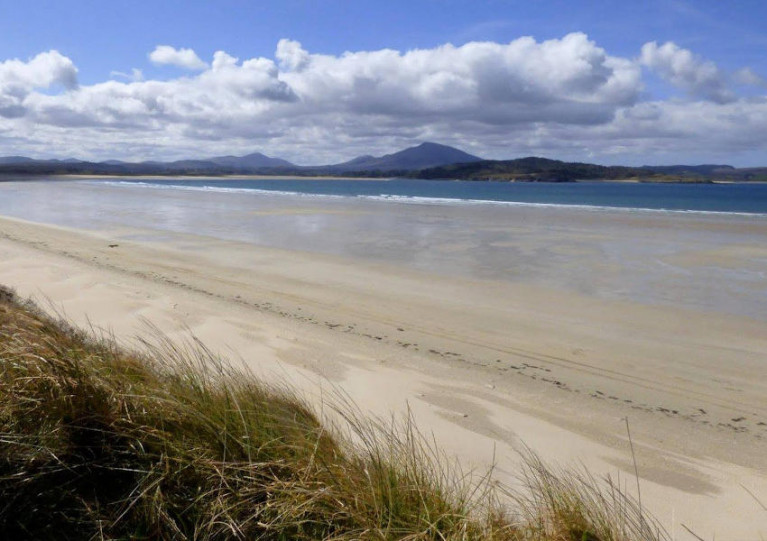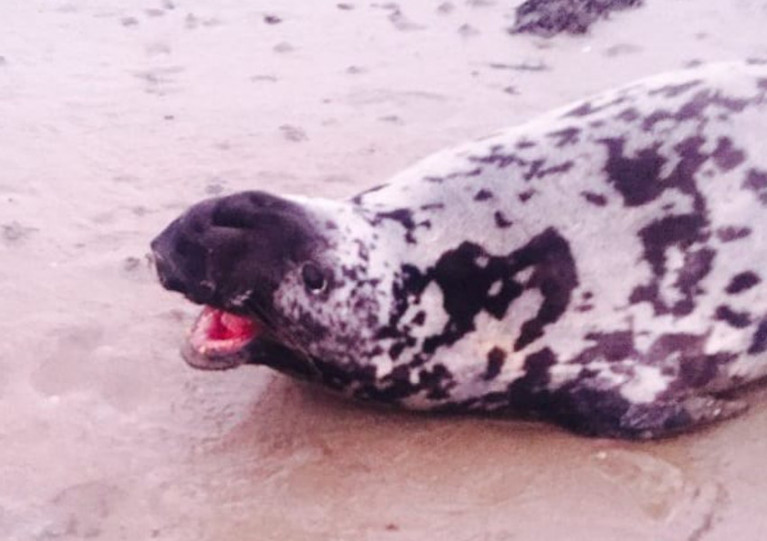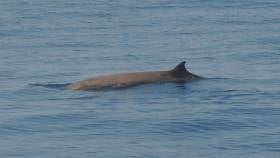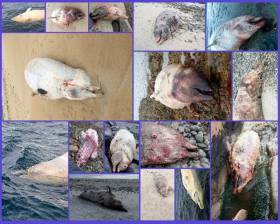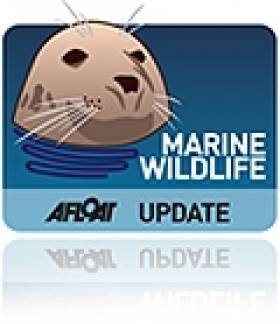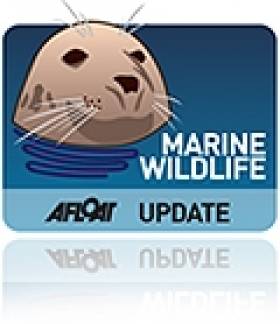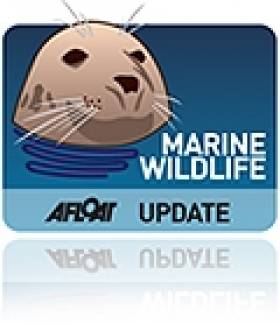Displaying items by tag: Cuvier's Beaked Whales
IWDG Records Spate of Dolphin & Whale Strandings Around Irish Coast
The Irish Whale and Dolphin Group (IWDG) has appealed for the public to keep a look-out after a spate of marine wildlife strandings reported in recent days.
Half of the six reports were live strandings, the group says, but only one animal was successfully returned to the water.
In Galway, a common dolphin live stranded with serious injuries but died shortly after IWDG members arrived at the scene.
Another common dolphin live stranded at Mulranny in Co Mayo. Local woman Catherine Hanley, who reported the stranding, managed to refloat this dolphin with her group and it has not been seen since.
In Co Donegal, a “very emaciated” Cuvier’s beaked whale live stranded at Dooey Beach in Downings, on the Rosguill peninsula, but died shortly after.
 An emaciated Cuvier’s beaked whale live stranded on Dooey Beach in Downings. The deep-ocean species has a significant population near Irish waters but is rarely sighted
An emaciated Cuvier’s beaked whale live stranded on Dooey Beach in Downings. The deep-ocean species has a significant population near Irish waters but is rarely sighted
Elsewhere, the remains of three more cetaceans were reported around the coast in recent days.
In Rathmullen, Co Donegal, the carcass of a common dolphin appears to match video of a dolphin swimming in the area the previous day, suggesting a live stranding.
At Greenore in Co Louth, at the mouth of Carlingford Lough, a common dolphin in “very fresh condition” was reported to the local IWDG group.
And in Passage East, Co Waterford, a carcass in “very poor” condition has been logged as “dolphin species” as its advanced state of composition made further identification impossible.
The IWDG appeals for the public to report all strandings “so we respond immediately and monitor the status of our whales and dolphins”.
Royal Navy Admits Presence in Area Linked to Whale Strandings in 2018
The UK’s Royal Navy has admitted that it was conducting operations in an area linked to the mass stranding of deep-diving whales in Ireland and Scotland three years ago, according to a report in The Times.
Record numbers of beaked whales stranded along Ireland’s North West between Galway and Donegal throughout August 2018, with a similar number found in Scotland. Records were also made in Iceland and the Faroe Islands.
The matter became the focus of a joint investigation by the Department of Foreign Affairs and UK authorities, which later traced the whales’ origin to the Porcupine Bank some 200km off the West Coast.
Use of sonar has been blamed by some experts for previous strandings of deep-diving species like the Cuvier’s beaked whale.
While the Royal Navy is known to use sonar in its operations, unlike Ireland’s Naval Service, it issued a statement in August 2018 saying that there is “no evidence that the deaths of these marine mammals have been attributed to any Royal Navy sonar operations, trials or exercises”.
The Times has more on the story HERE. (Subscription required.)
Beaked Whale Carcasses Stun Visitors to Co Donegal Beach
Visitors to a beach recently named among the 10 best in Ireland were shocked to discover the remains of three whales washed up on the strand, as the Irish Examiner reports.
The three carcasses found on Trá Mór in Donegal at the weekend are understood to be Cuvier’s beaked whales, a deep-ocean marine wildlife species that is rarely spotted in the wild and which was at the centre of a concerning mass stranding event two-and-a-half years ago.
Trá Mór is included, along with Ballymastocker Bay on the nearby Fanad Peninsula, in Lonely Planet’s list of the 10 best beaches in Ireland, as previously reported on Afloat.ie.
Unusual Seal Surprises In West Cork Among New Year Coastal Sightings
A seal rarely sighted in Irish waters was among the first sightings of the New Year by eagle-eyed supporters of the Irish Whale and Dolphin Group (IWDG).
The hooded seal was spotted by Helen Tilson of Schull Sea Safari on the mudflats at Toormore Bay in West Cork on New Year’s Day, and represents only the fourth or fifth Irish record for the Arctic marine wildlife species.
Video recorded by Tilson of the animal “removed any doubt” it was a a hooded seal “as it shows the nasal sac starting to balloon as she approached it, and it made a growling roar, the likes of which I’ve never heard from one of our grey seal bulls”, according to IWDG sightings officer Pádraig Whooley.
It’s believed this particular seal is a sub-adult male “in rather thin condition”, which is to be expected as it is so far south of its usual range.
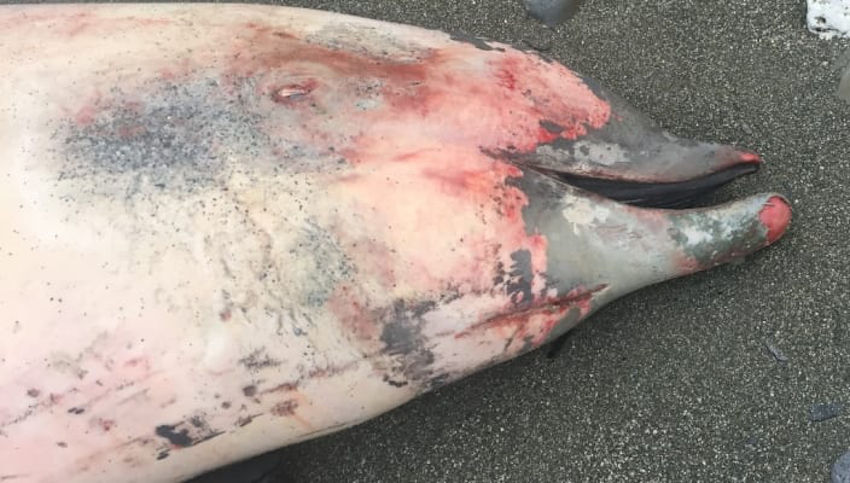 Cuvier’s beaked whale carcass in Clonakilty Bay on 21 December | Photo: Grace Keane O’Connor
Cuvier’s beaked whale carcass in Clonakilty Bay on 21 December | Photo: Grace Keane O’Connor
Meanwhile, reports of four stranded Cuvier’s beaked whale carcasses within 12 days and 70km of each other in December have prompted fears of a new mass stranding event for the deep water species.
The IWDG’s Mick O’Connell said all four were recorded along the Cork coast, beginning in Tragumna (16 December) and followed by Castlepoint in Roaringwater Bay (17 Dec), Lislevane in Clonakilty (21 Dec) and offshore at Galley Head (27 Dec).
“For the third time in five years we are looking at an unusual mass stranding of Cuvier’s beaked whales on the Irish coast, likely caused by a single event at sea,” he said.
But the situation as yet defies explanation. “Without specialised post-mortem of very freshly dead animals … we can’t even establish cause of death,” O’Donnell added.
State To Assist In Beaked Whale Deaths Investigation
#MarineWildlife - The Department of Foreign Affairs will assist with an investigation into the extraordinary numbers of Cuvier’s beaked whale deaths in Irish waters over recent weeks.
Tánaiste and Foreign Affairs Minister Simon Coveney has “instructed his department, in consultation with the National Parks and Wildlife Service, to initiate discussions regarding these about large number of stranded Cuvier's beaked whales with the UK authorities,” according to the Irish Whale and Dolphin Group.
As previously reported on Afloat.ie, the IWDG had expressed concern over the large numbers of dead beaked whales washed up on Ireland’s North West coast last month.
The total of whale strandings since the beginning of August has now risen to 58 across Ireland and Scotland, many of them Cuvier’s or True’s beaked whales, as BBC News reports.
Record Numbers Of Beaked Whale Deaths Cause Alarm
#MarineWildlife - The Irish Whale and Dolphin Group (IWDG) has expressed concern in the wake of at least 16 Cuvier’s beaked whales washing up on the Irish coast this month.
Following the discovery of five beaked whales in a single day at the start of August, the IWDG says a minimum of 16 — a new Irish record — were recorded along the North West coast from Galway to Donegal between 3 and 22 August.
“During the same period, at least 13 were found in Scotland and two in Iceland,” said IWDG strandings officer Mick O’Connell.
“Previous studies have suggested that only a small number of dead animals actually get washed ashore and recorded, so the number of dead animals may be significantly higher.”
While no cause of death has been established, due to the poor condition of the carcasses, it appears that the animals all died around the same time, which “makes causes such as disease, plastic ingestion etc seem unlikely as these would tend to be spread out over a longer time period and perhaps geographical range,” O’Connell said.
“The behaviour and distribution of this species makes large-scale fisheries interaction also seem unlikely.”
Sonar use has been suspected as a cause in previous similar strandings. “Mass strandings of beaked whales coincidental with naval exercises have been recorded in Greece, the Canaries and the Bahamas,” O’Connell said.
According to TheJournal.ie, the Royal Navy denies its use of sonar in training exercises causes any harm to marine wildlife.
The Naval Service in Ireland does not use sonar on its vessels.
In more positive marine mammal news, Nuala Moore writes for Independent.ie about her experiences swimming in Dingle harbour with its longtime resident dolphin Fungie.
The open sea swimming enthusiast made headlines earlier this year for becoming the first Irish woman to swim off Cape Horn.
But in Dingle, she’s just another acquaintance for Fungie in his daily adventures.
Deepwater Whale Strandings Are 'Unusual Mortality Event' – But Sonar Not Confirmed As Culprit
#MarineWildlife - The Irish Whale and Dolphin Group (IWDG) has issued a joint statement with fellow marine wildlife conservation groups on what's been labelled as "an unusual mortality event" involving Cuvier's beaked whales in Scotland and Ireland.
Last month, scientists in Scotland said they were baffled by the "unusually large number" of strandings of the deep-water whale species, rarely seen because they feed so far below the surface.
More recently, the Sunday World reported on further strandings on beaches around Ireland – leading some experts to point the finger at the suspected use of sonar in the British navy's alleged search for a rogue Russian submarine at the end of last year.
The joint statement says there are "many case studies from the Atlantic and Pacific Oceans and Mediterranean Sea where mass strandings of this species were linked to exercised using military sonar.
"Furthermore, a controlled exposure experiment has demonstrated prolonged reactions by some beaked whale species to navy sonar."
However, only anecdotal evidence of any naval sonar activity in the affected areas exists, and the Naval Service has told The Irish Times that it had no knowledge of any such activity over that period.
Similarly, the Department of Energy said no seismic surveys had been conducted offshore since October, and that any such surveys – a significant source of underwater noise that can be harmful to cetaceans – must comply with National Parks and Wildlife Service Guidelines.
The Irish Times has more on the story HERE.
Real-Life 'Hunt for Red October' Linked To Beaked Whale Strandings
#MarineWildlife - Could the recent mass strandings of Cuvier's beaked whales in British and Irish waters be connected with the recent real-life 'Hunt for Red October'?
Last month scientists in Scotland were baffled by an "unusually large number" of strandings of the deep-water whale species, rarely seen because they feed so far below the surface.
And as the Sunday World reports, even more have been found washed up on beaches around Ireland since then, amid an alarmingly high rate of cetacean strandings for the start of this year that includes the killer whale beached in Waterford last week.
While the recent severe weather systems from the Atlantic have been suggested as a possible cause, another culprit might be the British navy's search for a rogue Russian submarine at the end of last year.
Mick O’Connell of the Irish Whale and Dolphin Group (IWDG) says that loud sonar such as that used to detect submarines can distress deep-diving whales into surfacing too fast and getting 'the bends'.
It's believed that all eight of the beaked whales washed up in Ireland died in the same incident.
Though their actual cause of death cannot be determined, decompression sickness has been suggested as reason for the earlier Scottish whale deaths.
The Sunday World has more on the story HERE.
Scottish Scientists At A Loss To Explain Beaked Whale Strandings
#MarineWildlife - An "unusually large number" of Cuvier’s beaked whale strandings in western Scotland in recent weeks has baffled marine scientists, as The Scotsman reports.
Five of the rarely seen species were found washed up on Scotland's west coast in late December, a five-fold rise on the annual average.
And as Dr Conor Ryan of the Hebridean Whale and Dolphin Trust states, there are "no obvious clues as to what is causing such an obvious increase in strandings."
Recent stormy conditions may be a factor, he said, but alone they don't explain "why we are finding just one deep-diving species in such high numbers."
According to BBC Earth, Cuvier's beaked whales are the deepest diving of any large marine wildlife, plunging almost 3km into the depths in search of food, thanks to a unique physiology that allows them to withstand the crushing pressures and lack of oxygen.
It's possible that the whales may have succumbed to 'the bends' – which killed 14 beaked whales that washed up in the Canaries in 2002 – but the poor condition of the carcasses has ruled out any clues that a postmortem might provide.
The Scotsman has more on the story HERE.


























